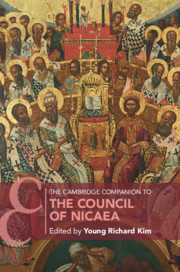Book contents
- The Cambridge Companion to the Council of Nicaea
- Cambridge Companions to Religion
- The Cambridge Companion to the Council of Nicaea
- Copyright page
- Dedication
- Contents
- Figures
- Contributors
- Acknowledgements
- Abbreviations
- 1 Introduction
- Part I Contexts
- Part II The Council
- Part III Outcomes
- Part IV The Aftermath
- 11 The Reception of Nicaea and Homoousios to 360
- 12 The Emergence of the Pro-Nicene Alliance
- 13 Apollinarius and the Nicene Homoousion
- 14 The Council of Ariminum (359) and the Rise of the Neo-Nicenes
- Part V The Long Reception
- Appendices
- Bibliography
- Index
- References
11 - The Reception of Nicaea and Homoousios to 360
from Part IV - The Aftermath
Published online by Cambridge University Press: 17 December 2020
- The Cambridge Companion to the Council of Nicaea
- Cambridge Companions to Religion
- The Cambridge Companion to the Council of Nicaea
- Copyright page
- Dedication
- Contents
- Figures
- Contributors
- Acknowledgements
- Abbreviations
- 1 Introduction
- Part I Contexts
- Part II The Council
- Part III Outcomes
- Part IV The Aftermath
- 11 The Reception of Nicaea and Homoousios to 360
- 12 The Emergence of the Pro-Nicene Alliance
- 13 Apollinarius and the Nicene Homoousion
- 14 The Council of Ariminum (359) and the Rise of the Neo-Nicenes
- Part V The Long Reception
- Appendices
- Bibliography
- Index
- References
Summary
The main acts of Nicaea were gradually reversed over the years 327-60. Constantine honored its name and canons throughout his life, but recalled Arius from exile, leaned on church leaders to restore him to communion, and sidelined Arius’s opponents. Constantius II flouted Nicaea’s canons and officially replaced its creed. Nonetheless, Nicaea’s pronouncements on the Son’s relationship to the ousia of the Father, including the term homoousios, which had been a response to Eusebius of Nicomedia’s Letter to Paulinus of Tyre, continued to be debated throughout this period in a succession of mutually allusive theological works. These include Eusebius of Caesarea’s Letter to his Church, Eustathius of Antioch’s Against the Arian Madness, Asterius the Sophist’s Defence of Eusebius of Nicomedia, Marcellus of Ancyra’s Against Asterius, Eusebius’s Against Marcellus and On Ecclesiastical Theology, Acacius of Caesarea’s Against Marcellus, Marcellus’ Letter to Julius of Rome, Athanasius’s Orations Against the Arians, the Profession of Faith of Sirmium 351, and Athanasius’s On the Decrees of Nicaea. The last of these, together with his formidable political skills, established the Nicene Creed against all the odds as the only formula which was able to command widespread support among bishops across the empire after the death of Constantius.
Keywords
- Type
- Chapter
- Information
- The Cambridge Companion to the Council of Nicaea , pp. 225 - 255Publisher: Cambridge University PressPrint publication year: 2021



